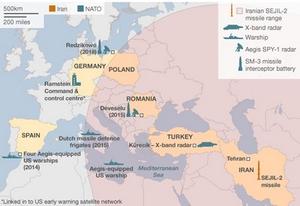Missile defenseU.S. cancels final phase of European missile defense system
Faced with sequestration-imposed budget cuts, the Pentagon cancels the fourth and final phase of the U.S. European missile defense system. The money made available by the decision would be used to fund the deployment of fourteen additional missile interceptors in Alaska to increase U.S. defense against North Korea’s missile threat. The Pentagon said that the first three phases of the defensive missile deployment in Europe, when completed in 2018, would provide coverage of all of NATO members.

Cancellation covers a wide area of Iranian missile range // Source: vijesti.me
U.S. Secretary of Defense Chuck Hagel announced on Friday that the Pentagon was cancelling the final phase of the U.S. European missile defense system. Hagel said funding cuts and technological problems led to the decision.
The deployment of the interceptors in Poland was meant to counter to growing threat from advanced Iranian ballistic missiles, and Hagel said that the U.S. commitment to NATO missile defense remained “ironclad.”
The BBC notes that the missile deployment was harshly criticized by Russia, which saw the defensive systems as eroding Russia’s nuclear deterrence. The United States argued that the defensive systems were capable of intercepting only a limited number of ICBMs – and Iran and North Korea would both have but a limited number of ICBMS for the foreseeable future – and as such would pose no meaningful threat to the Russian missile fleet, which numbers in the thousands.
Still, Russia has threatened to pull out of further negotiations over deeper cuts in the U.S. and Russian nuclear arsenals if the United States were to go ahead with the defensive deployments.
The BBC reports that the cancellation of the fourth and final phase of the European Phased Adaptive Approach (EPAA) for missile defense was announced quietly at a news conference.
Hagel also confirmed that in order to fund fourteen new Ground-Based Interceptors (GBIs) in Alaska by 2017 to increase defense against North Korea’s missile threat, the SM-3 IIB program, which is a land-based standard missile, would be “restructured (see “U.S. to bolster missile defense to meet North Korean threat,” HSNW, 15 March 2013).
“The purpose was to add to the protection of the U.S. homeland already provided by our current GBIs against missile threats from the Middle East,” Hagel said. “The timeline for deploying this program had been delayed to at least 2022 due to cuts in Congressional funding. Meanwhile, the threat matures.
“By shifting resources from this lagging program to fund the additional GBIs as well as advanced kill vehicle technology that will improve the performance of the GBI and other versions of the SM-3 interceptor, we will be able to add protection against missiles from Iran sooner while also providing additional protection against the North Korean threat.”
Hagel stressed that the decision would have no effect on the level of protection from missile attacks U.S. NATO allies would have. The first three phases of the EPAA, when completed in 2018, would provide coverage of all of NATO members.
“Let me emphasize the strong and continued commitment of the United States to NATO missile defense. That commitment remains ironclad.”
He sequestration-imposed budget cuts have forced the Pentagon to find ways to trim tens of millions of dollars from its budget this year, leading the U.S. military to re-evaluate and prioritize programs and missions.
“Cancelling phase 4 opens the door to another round of U.S.-Russian nuclear arms reductions,” Tom Collina, research director at the Arms Control Association, told AP. “We give up nothing since phase 4 was not panning out anyway. This is a win-win for the United States.”
Republican lawmakers were quick to criticize the decision.
“President Obama’s reverse course decision will cost the American taxpayer more money and upset our allies,” said Representative Mike Rogers (R-Michigan), who chairs the Strategic Forces Subcommittee of the House Armed Services Committee, which oversees ballistic missile defense.
Rogers said that even though North Korea is still many years away from developing an inter-continental ballistic missile with nuclear capability with which to threaten the United States, the United States must still stay ahead of the North Korean threat.
